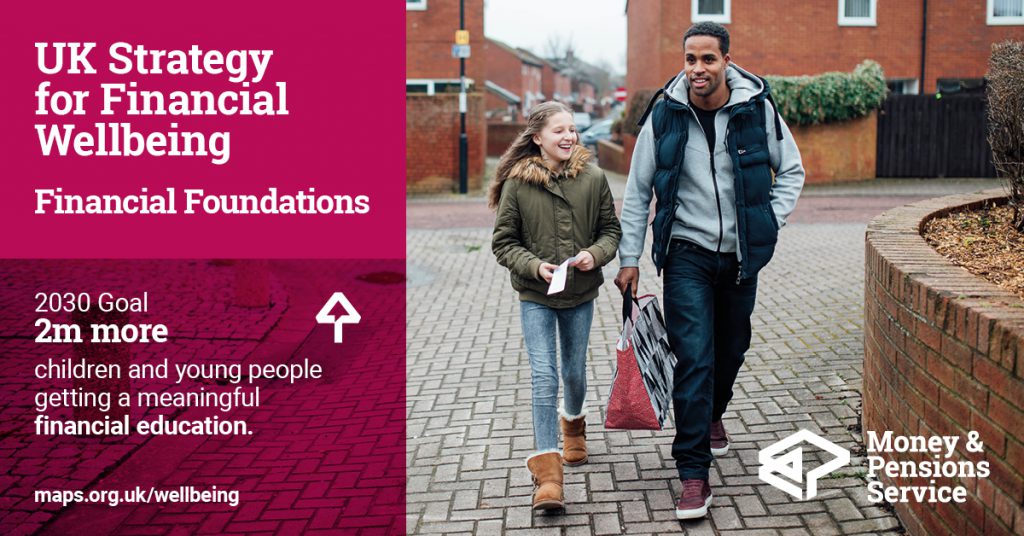
Financial education in schools
- How we support financial education in schools
- Talk Money Week
- Our goal for financial education
- Why financial education is important
- Four ways to improve children's financial wellbeing
- Resources to support financial education teaching
- Financial education in your national curriculum
- Support the financial wellbeing of staff
The Money and Pensions Service (MaPS) is an arm’s-length body of the UK Government that works with stakeholders across a range of sectors to help improve financial education in schools, at home and in the community.
Alongside parents and carers, schools and teachers are uniquely placed to help children and young people to develop the money skills they need
How we support financial education in schools
To improve the provision of financial education, we:
- Support the development of and access to financial education tools and services.
- Fund the delivery of financial education programmes, to test new approaches and increase the availability of interventions that work.
- Undertake and promote research to improve our understanding of children and young people’s financial education needs and their financial wellbeing.
- Run and contribute to networks that support the development of financial education tools and sharing of best practice.
Talk Money Week
Taking place from 6–10 November 2023, Talk Money Week is an opportunity for everyone to get involved with events and activities across the UK which help people have more open conversations about their money, including in education settings.
We’re calling on all schools and colleges across the UK to do what they can to help the children and young people they work with to talk money.
Learn more about Talk Money Week
Download the Talk Money Week schools kit
Our goal for financial education

MaPS leads delivery of the UK Strategy for Financial Wellbeing, working towards a vision of everyone making the most of their money and pensions. The strategy includes a goal to ensure that, by 2030, two million more children and young people in the UK are receiving a meaningful financial education.
Learn more about the UK Strategy for Financial Wellbeing
Why financial education is important
Research shows that financial education makes children and young people more likely to:
- save money
- have a bank account
- be confident with money management.
Our research also shows that a majority of children and young people say they find financial education useful.
Financial education can enhance existing curricula or can be extra-curricular. The subject can enhance an array of subjects too. It can bring the maths curriculum to life using examples relevant to students’ lives, or can be incorporated into personal development, health and wellbeing and citizenship topics.
Financial education enhances financial wellbeing and prepares students to understand and manage their incomes as adults.
Explore the latest financial education news and research
Four ways to improve children’s financial wellbeing
Start early. Evidence tells us that children’s attitudes about money are well developed by the age of seven. So, incorporate learning about the world of money into your teaching from pre-school upwards.
Put learning into practice. Providing pupils with a combination of in-class and experiential learning has been shown to be most effective. You could organise a school savings bank, support groups of students to open bank accounts or give children the opportunity to manage a budget.
Make the most of everyday events. Financial education can be particularly effective if it coincides with an opportunity for the young person to put it into practice. For example, more detailed learning about banks and saving could coincide with students approaching the age of 11 when they can open an account.
Involve parents and carers. As in other areas of learning, school-based financial education will be most successful when parents are engaged too. Invite parents to get involved in experiential financial learning activities, or encourage students and parents to develop their learning together at home.
Resources to support financial education teaching
Your Money Matters financial education textbook
Co-funded with Money Saving Expert’s Martin Lewis, Young Money’s secondary level financial education textbook is being tailored to curricula across the UK. It also comes with a teaching guide. Learn more and download free copies.
Curriculum planning
The Financial Education Planning Frameworks, endorsed by MaPS, set out the key areas of money knowledge, skills and attitudes relevant to children and young people, helping schools plan, deliver and monitor progression. They are available in English and Welsh.
Financial education guidance for schools
MaPS guidance for schools highlights the links between financial education and the curriculum, sets out how schools can improve the financial education they deliver, and signposts to services and resources that can help.
Find effective resources
We fund Young Money’s Financial Education Quality Mark to help teachers find effective resources.
Research into what works and our insights
Download our latest findings on financial education in schools.
Financial education in your national curriculum
England
In England, financial education is included in the national curriculum in secondary schools only, as part of citizenship and maths.
- Pupils should be taught about the functions and uses of money, budgeting, managing risk, credit and debt, insurance, savings and pensions, financial services and applying maths to financial contexts (such as calculating interest).
- While specific financial education is not a requirement in primary schools, the maths curriculum does include some learning about money (such as understanding £ and p, using coins and calculating change).
- All schools are expected to deliver PSHE, including some financial education, using guidance provided by the PSHE Association
Northern Ireland
Financial capability is included in the national curriculum from age 4 to 14, mainly through maths and numeracy.
- By the end of primary school (age 11), pupils should be able to make calculations with money, and have learned about keeping money safe, budgeting and saving, planning ahead and making spending choices.
- By age 14, secondary school students should be able to demonstrate financial capability in everyday contexts, using their maths skills to learn about personal finance and financial decision-making.
- There are also elements of financial education in other secondary school subjects, including learning for life and work, modern languages and even music.
The Council for the Curriculum, Examinations and Assessment has a dedicated microsite with lots of ideas for weaving financial education through the whole curriculum.
Scotland
Financial capability is included in the broad general education phase curriculum for students aged 3 to 14 years, primarily in maths and numeracy across learning.
- By age 11, students should have developed an awareness of how money is used, learned how to calculate change, manage money, budget and compare costs, and understood the costs and benefits of using bank cards.
- By age 14, students should have learned about value for money (including in the context of contracts and services), more advanced budgeting, credit and debt, earnings and taxes and comparing and choosing personal finance products.
- Financial education is also part of the social studies curriculum mainly as part of learning about business and enterprise, covering topics like shops and services, ethical trading, paying for essential goods, budgeting, saving, borrowing and finance for business.
- In the senior phase (ages 15-18), it is expected that all National Qualifications help to develop students’ numeracy and skills for learning, life and work.
Download financial education guidance for primary schools in Scotland
Download financial education guidance for secondary schools in Scotland
Wales
A new Curriculum for Wales will be rolled out from 2022, with financial education relevant to a number of the new areas of learning and experience, including maths and numeracy and health and well-being.
In the current curriculum, financial education is included in both primary and secondary schools as part of Mathematical Development and Personal and Social Education.
- By the end of primary school (age 11), pupils should have learned to do calculations using money, understand the use of £ and p, and be able to compare costs and budget, plan and track money and savings, calculate profit and loss, and assess value for money.
- By age 16, they should know about different currencies and exchange rates, be able to carry out more complex calculations (such as compound interest), know how to compare and choose financial products and have practiced managing household budgets.
- In personal and social education, students learn about how money is earned and the importance of saving and looking after your money.
- The National Literacy and Numeracy Frameworks, which help teachers embed reading and maths across all curriculum areas, also includes learner outcomes relating to managing money.
Support the financial wellbeing of staff
Money worries are the biggest cause of stress for UK employees.
Visit our financial wellbeing in the workplace hub to explore ways that you can support the financial wellbeing of your staff and find a wealth of evidence about what works to proactively build financial wellbeing.
For more support, contact our partnerships team, based across the UK in locations near you.
